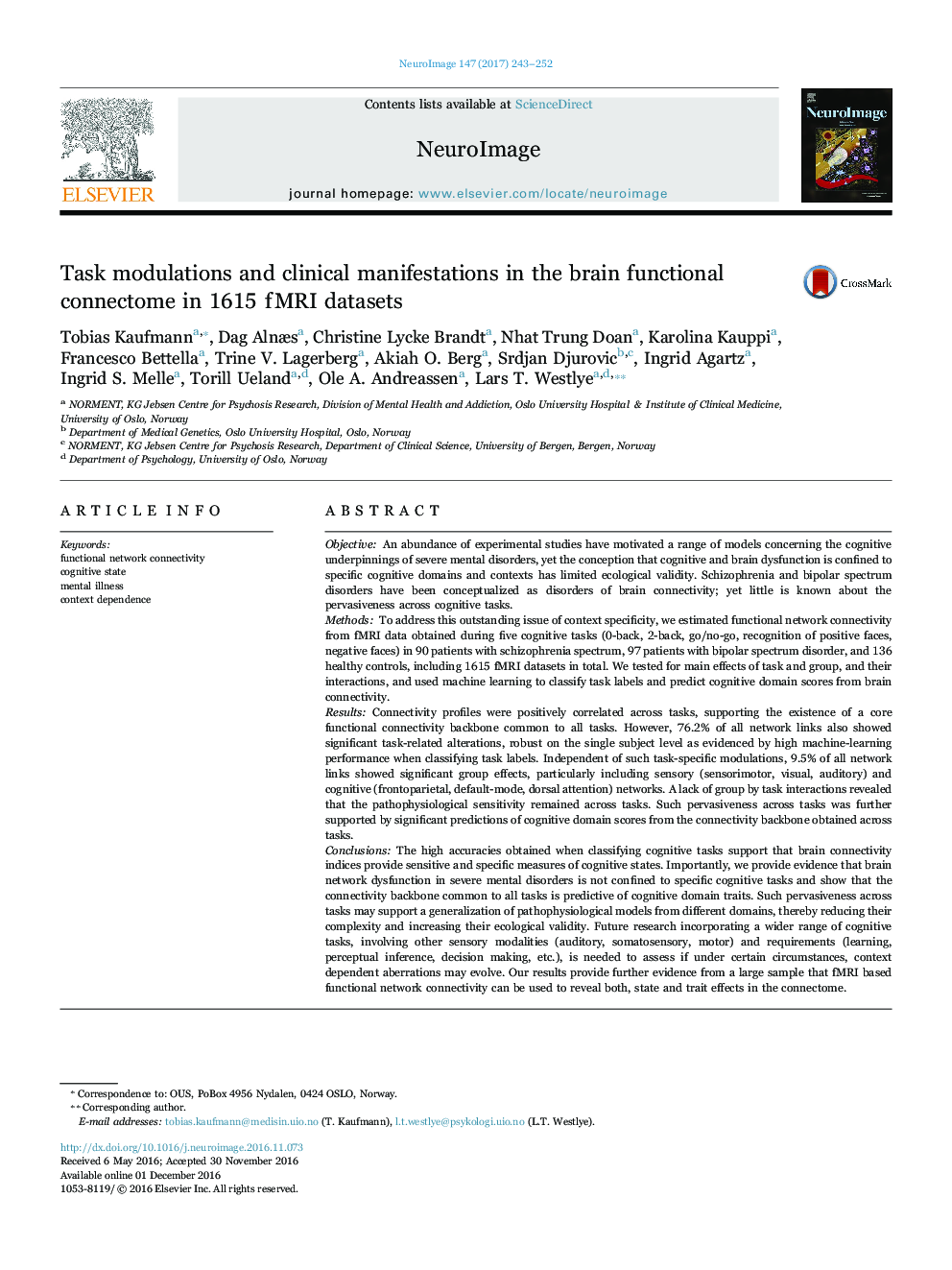| کد مقاله | کد نشریه | سال انتشار | مقاله انگلیسی | نسخه تمام متن |
|---|---|---|---|---|
| 5631500 | 1580863 | 2017 | 10 صفحه PDF | دانلود رایگان |

- We obtained fMRI from 187 patients with severe mental illness and 136 controls.
- We assessed connectivity during five cognitive tasks, resulting in 1615 data sets.
- Tasks strongly altered networks, supporting sensitivity of fMRI to cognitive states.
- Clinical network dysfunction was pervasive across the studied tasks.
- We successfully predicted cognitive traits from connectivity.
ObjectiveAn abundance of experimental studies have motivated a range of models concerning the cognitive underpinnings of severe mental disorders, yet the conception that cognitive and brain dysfunction is confined to specific cognitive domains and contexts has limited ecological validity. Schizophrenia and bipolar spectrum disorders have been conceptualized as disorders of brain connectivity; yet little is known about the pervasiveness across cognitive tasks.MethodsTo address this outstanding issue of context specificity, we estimated functional network connectivity from fMRI data obtained during five cognitive tasks (0-back, 2-back, go/no-go, recognition of positive faces, negative faces) in 90 patients with schizophrenia spectrum, 97 patients with bipolar spectrum disorder, and 136 healthy controls, including 1615 fMRI datasets in total. We tested for main effects of task and group, and their interactions, and used machine learning to classify task labels and predict cognitive domain scores from brain connectivity.ResultsConnectivity profiles were positively correlated across tasks, supporting the existence of a core functional connectivity backbone common to all tasks. However, 76.2% of all network links also showed significant task-related alterations, robust on the single subject level as evidenced by high machine-learning performance when classifying task labels. Independent of such task-specific modulations, 9.5% of all network links showed significant group effects, particularly including sensory (sensorimotor, visual, auditory) and cognitive (frontoparietal, default-mode, dorsal attention) networks. A lack of group by task interactions revealed that the pathophysiological sensitivity remained across tasks. Such pervasiveness across tasks was further supported by significant predictions of cognitive domain scores from the connectivity backbone obtained across tasks.ConclusionsThe high accuracies obtained when classifying cognitive tasks support that brain connectivity indices provide sensitive and specific measures of cognitive states. Importantly, we provide evidence that brain network dysfunction in severe mental disorders is not confined to specific cognitive tasks and show that the connectivity backbone common to all tasks is predictive of cognitive domain traits. Such pervasiveness across tasks may support a generalization of pathophysiological models from different domains, thereby reducing their complexity and increasing their ecological validity. Future research incorporating a wider range of cognitive tasks, involving other sensory modalities (auditory, somatosensory, motor) and requirements (learning, perceptual inference, decision making, etc.), is needed to assess if under certain circumstances, context dependent aberrations may evolve. Our results provide further evidence from a large sample that fMRI based functional network connectivity can be used to reveal both, state and trait effects in the connectome.
Journal: NeuroImage - Volume 147, 15 February 2017, Pages 243-252